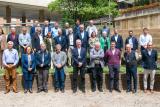Erasmus+ teaching missions
In addition to learner mobility, the Erasmus+ program promotes teaching assignments for faculty members at higher education institutions. UNamur professors can thus carry out teaching assignments in a partner university, with which UNamur has concluded a bilateral exchange agreement.
Thanks to this action, it is possible, among other things:
- To contribute to the strengthening of bilateral relations between UNamur and the partner university;
- To develop innovative pedagogical approaches;
- To exchange best practices;
- To acquire new skills and experience at both personal and professional levels.
Eligible for this type of assignment are members of UNamur's teaching staff on the institution's payroll. This does not include temporary and freelance staff (APH) hired by UNamur.
Criteria:
- The teaching assignment must be carried out in one of UNamur's partner institutions in Europe and, to a lesser extent, as the funding available is fairly limited, outside the EU or in an institution in the Flemish community, provided that a bilateral "Erasmus"-type agreement providing for staff mobility exists ;
- The assignment must involve a minimum of 8 hours of teaching per week (or for any stay of less than a week) and the hours of teaching given must be an integral part of a degree course at the host institution.
- The assignment must last a minimum of 2 days.
- The course program must be the subject of a teaching agreement between the teacher and the sending and host partner institutions
It is also possible to combine a training stay (linked to research) with a teaching activity. In this case, the compulsory number of teaching hours is 4 (instead of 8).
Caution: Erasmus+ funding cannot be requested for participation in conferences. For this type of activity, other sources of funding are available.
Erasmus+ training missions
The Erasmus+ program also provides funding to enable staff members at higher education institutions to undergo training at a university, company or other public or private organization in Europe and, to a lesser extent, outside the EU.
This type of assignment enables the staff members concerned:
- To acquire knowledge or know-how based on experience and good practice elsewhere;
- To acquire new skills useful in the work carried out or with a view to further professional development;
- To create new links, particularly with new partners or companies;
- In the context of assignments carried out at partner institutions, to contribute to the strengthening of already existing collaborative links.
Training missions can take a variety of forms: short periods of secondment, job shadowing visits, study visits, workshops, etc.
Criteria:
- The mission must have a duration of at least 2 days.
- The training activities, as well as the expected results, must be described in detail in a training agreement drawn up between the staff member and the host institution and signed by the UNamur staff member's line manager.
- The staff member carrying out the training mission undertakes to share his or her experience with other members of the institution (close colleagues, colleagues from other entities, students, external audiences, etc.).
Financial support
Financial support granted via the Erasmus+ program is calculated on a flat-rate basis and provides for a travel package and per diem.
The contribution towards travel expenses is based on the one-way distance calculated via the calculation tool of the European Commission.
The contribution towards living expenses is based on the cost-of-living indices taken into account by the European Commission.
Administrative procedure
Funding applications can be submitted at any time to the International Relations Department, 3 months minimum months before the presumed start date of the assignment.
For Erasmus+ teaching or training assignments lasting a maximum of 5 days of activity to an EU destination or to a third country associated with the Erasmus program, funding is in principle granted automatically and immediately, within the limit of the available annual Erasmus budget. For missions to Flanders or a third country not associated with the Erasmus program, the staff member must contact the SRI well in advance of the mission to check whether it is eligible and whether funds are available.


